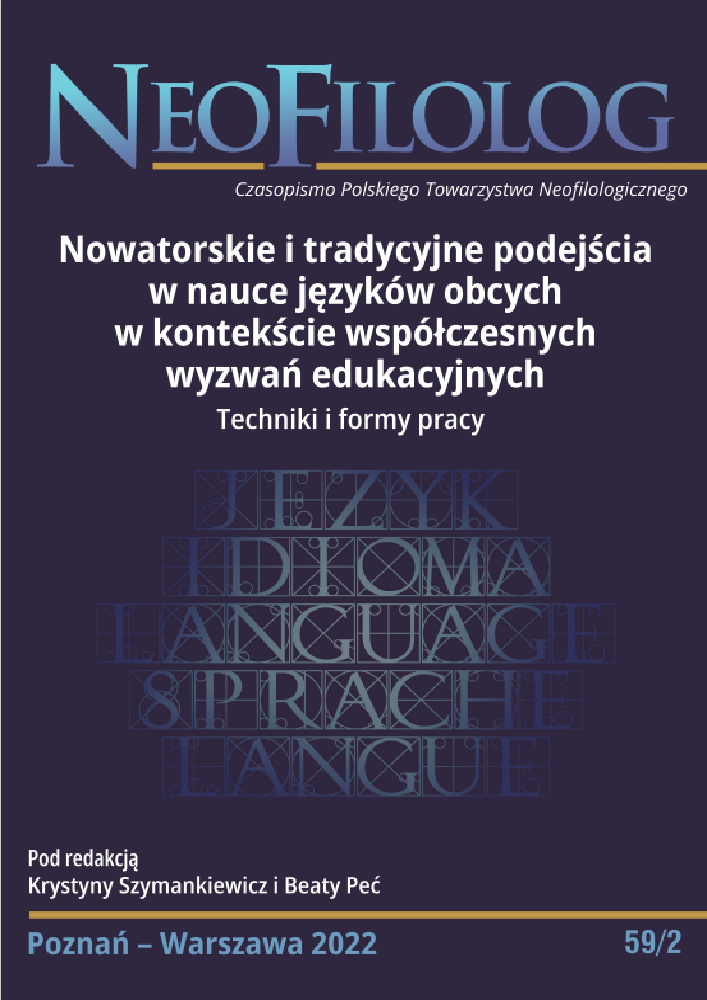Abstract
Tutoring means personalized cognitive, metacognitive and affective support of the individual to better guide him/her on the path of learning or teaching. It seems to be experiencing a revival of interest in this difficultperiod of the pandemic where education is increasingly conflicting between face-to-face and distance learning.
Tutoring is considered to be one of the most powerful devices for helping students succeed, but we propose to show its benefits also for teacher-researchers in the pedagogical aspect of their work. Our objective will be to synthesize the French and Anglo-Saxon experience that have long explored the positive impact of tutoring in the university context as well as to examine the conditions for its implementation in university courses in Poland.
Our experience as a tutor of university teachers - although not yet very rich - will allow us to analyze some concrete cases.
Literaturhinweise
Annoot E. (2001), Le tutorat ou « le temps suspendu ». "Revue des sciences de l'éducation ", 27(2), p. 383-402. Online : https://doi.org/10.7202/009938ar, [consulté le 11.06. 2022]. https://doi.org/10.7202/009938ar
Baudrit A. (2000), Le tutorat : un enjeu pour une pratique pédagogique devenue objet scientifique ? "Revue Française de Pédagogie ", 132, p. 125-153. https://doi.org/10.3406/rfp.2000.1039
Baumann, U., Shelley, M., Murphy, M., White, C. (2008), New challenges, the role of the tutor in the teaching of languages at a distance. " Distances et savoirs ". 6 (3) s.365-392. Online : https://ds.revuesonline.com/gratuit/DS6_3_05_Baumann.pdf, [consulté le 23.05.2022]. https://doi.org/10.3166/ds.6.365-392
Becchetti-Bizot, C., Houzel, G., Taddei F. (2017), Vers une société apprenante : rapport sur la recherche et développement de l'éducation tout au long de la vie. Ministère de l'Education de l'Enseignement supérieur et de la Recherche, Online : https://www.education.gouv.fr/vers-une-societe-apprenante-rapport-sur-la-recherche-et-developpement-de-l-education-tout-au-long-de-5843 [consulté le 6.06. 2022].
Borkowska N. (2018), Tutoring w edukacji. "Colloquium Edukacja - Polityka - Historia", 4/(32), s. 5-20.
Brzezińska A. I., Appelt K. (2013), Tutoring nauczycielski - tutoring rówieśniczy: aspekty etyczne. "Forum Oświatowe", 2(49), s. 13-29.
Brzozowski T.T. (2017), Tutoring jako alternatywna metoda edukacji. "Przedsiębiorczość - Edukacja [Entrepreneurship - Education] ", 13, s. 291-303. https://doi.org/10.24917/20833296.13.21
De Ketele J.M. (2010), La pédagogie universitaire : un courant en plein développement. "Revue française de pédagogie" 172, s. 5-13, Online : <http://journals.openedition.org/rfp/2168> [consulté le 8.05.2022]. https://doi.org/10.4000/rfp.2168
Gordon E.E., Gordon E.H. (1990), Centuries of tutoring. A history of alternative education in America and Western Europe. Lanham : University Press of America.
Kwaśny J., Żur A. (2018). Tutoring a kształtowanie kompetencji przedsiębiorczych - studium przypadku Wydziałowej Indywidualnej Ścieżki Edukacyjnej. "Horyzonty Wychowania", 17(43), p. 85 94.
Karpińska-Musiał B. (2016), Edukacja spersonalizowana w uniwersytecie. Ideologia - instytucja - dydaktyka - tutor. Kraków: Wydawnictwo LIBRON.
Lebrun M. (2021), Pédagogie universitaire toujours en développement : un chemin partagé entre enseignants et conseillers. " Distances et médiations des savoirs" 34, Online : http://journals.openedition.org/dms/6280 , [consulté le 12.06.2022]. https://doi.org/10.4000/dms.6280
Ministerstwo Edukacji Narodowej. (2016), "Metoda tutoringu innowacyjnym sposobem pracy wychowawczej, profilaktycznej i resocjalizacyjnej", Konkurs nr DE-WZP-262.1.8.2016, Online: https://archiwum-bip.men.gov.pl/zadania-publiczne/metoda-tutoringu-innowacyjnym-sposobem-pracy-wychowawczej-profilaktycznej-i-resocjalizacyjnej-konkurs-nr-de-wzp-262-1-8-2016.html, [consulté le 12.06.2022].
Pourcelot C. (2020), Le tutorat universitaire en France : quelles mises en oeuvre pour quelle évaluation et amélioration ? "La Revue LeeE", 2 Online : https://doi.org/10.48325/rleee.002.03 [consulté le 12.06. 2022].
Sarnat-Ciastko A. (2014), Czy mnie dostrzegasz, czy odpowiadasz na moje potrzeby? Obecnośc znaków rozpoznania w relacji tutorów i ich podopiecznych. Perspektywa uczniów. "Przegląd Badań Edukacyjnych. Educational Studies Review", 19 (2/2014), s. 43-60. https://doi.org/10.12775/PBE.2014.021
Sarnat-Ciastko A., (2015), Tutoring w polskiej szkole. Warszawa: Wydawnictwo Difin.
Wagner L. (1990), Social and historical perspectives on peer teaching in education, (dans :) Foot H.C., Morgan M.J., et Shute R.H. (eds), Children helping children. New York : John Wiley et Sons, s. 21-42.
Wood D. (2000), Społeczne interakcje jako tutoring, (dans:) Brzezińska A., Lutomski G., Smykowski B. (eds.), Dziecko wśród rówieśników i dorosłych. Poznań: Zysk i S-ka Wydawnictwo, s. 214-245.
Lizenz
Copyright (c) 2022 Jolanta Sujecka-Zając

Dieses Werk steht unter der Lizenz Creative Commons Namensnennung - Keine Bearbeitungen 4.0 International.
Autoren:
Die Autoren der zur Veröffentlichung in der Zeitschrift Neofilolog angenommenen Texte sind verpflichtet, den Vertrag über die Erteilung einer kostenlosen Lizenz für die Werke mit der Verpflichtung zur Erteilung einer Sublizenz CC auszufüllen, zu unterzeichnen und an die Adresse der Redaktion zurückzusenden.
Gemäß Vertrag erteilen die Autoren auf die in der Zeitschrift Neofilolog veröffentlichten Texte der Adam-Mickiewicz-Universität in Poznań eine nicht exklusive und kostenlose Lizenz und erlauben die Verwendung der Sublizenz Creative Commons Attribution-NoDerivatives 4.0 International (CC BY-ND 4.0).
Die Autoren behalten das Recht zur weiteren freien Verfügung über das Werk.
Benutzer:
Interessierte Onlinebenutzer dürfen die seit 2017 veröffentlichten Werke unter folgenden Bedingungen nutzen:
- Anerkennung der Urheberschaft - die Verpflichtung, zusammen mit dem verbreiteten Werk Informationen über die Urheberschaft, den Titel, die Quelle (Links zum Originalwerk, DOI) und die Lizenz selbst bereitzustellen;
- ohne Schaffung abgeleiteter Werke - das Werk muss in seiner ursprünglichen Form erhalten bleiben, ohne Zustimmung des Autors dürfen keine Studien, beispielsweise Übersetzungen, verbreitet werden.
Die Urheberrechte aller veröffentlichen Texte sind vorbehalten.
Sonstige:
Die Adam-Mickiewicz-Universität in Poznań behält das Recht auf die Zeitschrift als Gesamtheit (Layout, Grafik, Titel, Umschlagsprojekt, Logo usw.).

